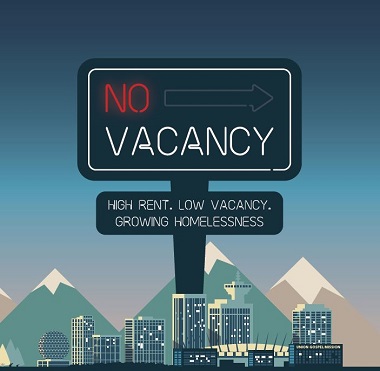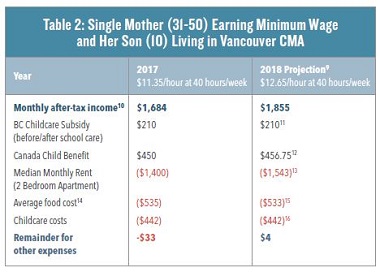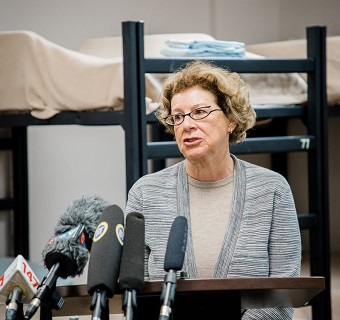 This week (October 7 – 13) is Homelessness Action Week, and no one can argue that Union Gospel Mission (UGM) is not doing its share.
This week (October 7 – 13) is Homelessness Action Week, and no one can argue that Union Gospel Mission (UGM) is not doing its share.
On Monday, volunteers served meals to more than 3,000 people. (See the Vancouver Sun’s article about Kevin Knight, who used to eat meals at UGM, but now runs a ministry in Cambodia for people who have been evicted from their homes. He was back at UGM this week to help serve the Thanksgiving meal.)
And today UGM released its latest ‘No Vacancy’ study. No Vacancy: High Rent. Low Vacancy. Growing Homelessness (pdf) , which follows up on a similar report undertaken in 2016 with the University of Victoria’s Canadian Institute for Substance Use Research (CISUR).
Following is UGM’s overview of its new study; for the full report go here (pdf).
A new report shows Metro Vancouver’s affordability crisis is surging into the suburbs at alarming speed, hammering low-income families and disproportionately affecting mothers on the brink of homelessness.
The report, which is titled No Vacancy and was coauthored by Union Gospel Mission and Dr. Penny Gurstein from UBC’s School of Community and Regional Planning (SCARP), reveals the following key findings:
• Vacancy rates outside the City of Vancouver have dramatically decreased. Suburban cities that once were an affordable refuge, such as Surrey and Burnaby, are now witnessing the most striking changes. Surrey’s vacancy rate fell from 5.7 percent in 2012 to near zero in 2017.
• There has been a 32 percent surge in the number of Metro Vancouver families on BC’s housing registry since 2014. This compares to a rise of 3 percent between 2012 and 2016.
 • A mom who is supporting a 10 year old child, while working full-time at minimum wage, would have just $4/month remaining after covering basic expenses, which do not include transportation costs, clothing, dental coverage, etc.
• A mom who is supporting a 10 year old child, while working full-time at minimum wage, would have just $4/month remaining after covering basic expenses, which do not include transportation costs, clothing, dental coverage, etc.
• 61 percent of families on the housing registry are led by single parents, and approximately 87 percent of these families are female-led.
• For families seeking affordable housing at the low end of market, particularly those renting at less than $750 per month, there are virtually no vacancies for two bedroom units (0 percent). Additionally, between 2012 and 2017, overall vacancy rates for two bedroom units dropped in Surrey from 6.5 percent to 0.7 percent, and in Burnaby from 2.8 percent to 0.8 percent.
• Shelter occupancy has consistently been over 100 percent for the past five years.
The report indicates these structural factors are particularly punishing for mothers like Jackie Myerion. After being evicted from her Surrey basement suite this summer, Jackie, along with her partner and two young children, resorted to living in a park, camping inside a tent for an entire month.
“It was devastating,” says the 35 year old. “It was horrible, really horrible to find housing.”
“I never thought we would be in that position,” says her 35 year old partner Jesse.

Dr. Penny Gurstein of UBC’s School of Community and Regional Planning spoke at UGM October 11; she is one of the authors of the report. UGM photo.
“Given the data, it’s no surprise that homelessness has continued to rise,” says Dr. Penny Gurstein of UBC’s School of Community and Regional Planning. “The crisis is particularly pronounced for low-income families because of low vacancy rates, rising rents and lack of adequate housing.”
As the crisis spreads, Union Gospel Mission is urging residents to ‘vote with affordability and homelessness in mind’ during the region’s municipal elections, launching a website that allows voters to easily research: 1) which mayoral candidates are running in their city, and 2) what those mayoral candidates have to say about addressing affordability and homelessness.
“The crisis is both pushing new people into homelessness and making it harder to escape,” says UGM’s Jeremy Hunka. “We’re not telling people how to vote. We’re giving them the tools to be educated at the ballot box and vote according to their convictions. The more focus on homelessness, the better, because lives are at stake.”
The authors of the report are:
- Dr. Penny Gurstein, PhD, School for Community and Regional Planning,
University of British Columbia - Erin LaRocque, BA (Hon), School for Community and Regional Planning,
University of British Columbia - Robert J. MacDonald, Union Gospel Mission Vancouver
UBC’s School of Community and Regional Planning (SCARP), founded in 1951, was one of the first dedicated planning schools in Canada. It is also one of the country’s largest, with 15 faculty and over 100 students. The school’s mission is to advance the transition to sustainability through excellence in integrated policy and planning research, professional education and community service.
Union Gospel Mission (UGM) has been feeding hope and changing lives of men, women, youth and children for more than 77 years. Through its seven locations in Metro Vancouver and the city of Mission, UGM provides emergency shelter, meals, outreach, career development counselling, education, safe and affordable housing, addiction recovery and much more to those struggling with poverty, homelessness and addiction. The heart of the mission is to demonstrate God’s transforming love, ease the burden of the most vulnerable, rebuild lives and offer dignity to those who feel cast aside.

I was on a committee to host a Mayoral Candidates Forum and was aware of the affordable housing crisis but last month experienced first hand the difficulty to find affordable rentals.
My friend is a 70 year old retired teacher on a small pension with a cat and dog, and helping her find a suitable one bedroom basement suite with no stairs has been almost impossible. She stayed with me for five weeks because of the kindness of the building manager as our building does not accept animals, and eventually went to a shelter.
Thankfully it was the only shelter on the North Shore which is well maintained and they, hearing of my friend’s plight, made provision for her as they rarely have any vacancies.
She was willing to go to any shelter, even as far out as Squamish and Abbotsford but they did not have any rooms available.
We were told by the staff that 80 percent funding goes to addictive and abusive victims yet more and more people like my friend are needing temporary shelters while seeking affordable rentals.
I feel the churches could do more and we are not using the resources we do have. A few of us are brainstorming on various solutions.
Single parent families and high rents are a precarious mix. But it is not only the rising costs of condos and houses. It’s the rising costs of maintenance and taxes that make it hard for single people to live in Metro Vancouver.
I’ve been a widow for over 9 years. The death of my husband meant I had to forfeit our car and I could not afford to remain in our condo in Vancouver. I wasn’t evicted. But I could not afford to live on my own. The maintenance fees, taxes and cable bills were too much for me to manage. To make it on my own, I had to sell my condo and move out to the suburbs to live close to my family.
I am now back in Vancouver. I am still single and paying the same amount of maintenance fees and taxes on a condo as a two income couple or a family of 4 or 5 would for the services they use. I don’t think this is fair. However this is the price I pay to live alone in and maintain a Vancouver condo to go out for a drink occasionally and afford a taxi or a bus ride home.
I do not want to see my property value plummet to ease the burden for young singles. I think that would only push more burden onto widowed seniors like myself who have invested in their homes.